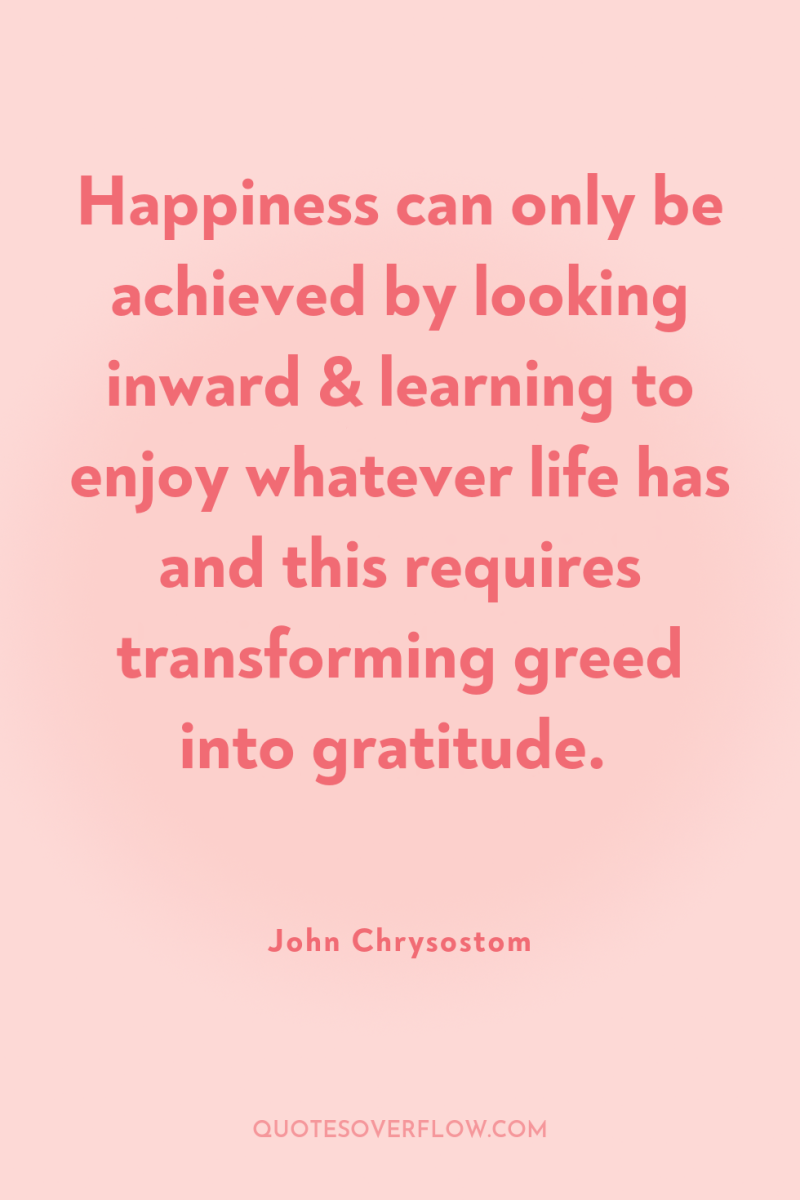We follow the ways of wolves, the habits of tigers: or, rather we are worse than they. To them nature has assigned that they should be thus fed, while God has honoured us with rational speech and a sense of equity. And yet we are become worse than the wild beast.John Chrysostom

Happiness can only be achieved by looking inward & learning to enjoy whatever life has and this requires transforming greed into gratitude.John Chrysostom
A friend is more to be longed for than the light; I speak of a genuine one. And wonder not: for it were better for us that the sun should be extinguished, than that we should be deprived of friends; better to live in darkness, than to be without friendsJohn Chrysostom
The potency of prayer hath subdued the strength of fire; it hath bridled the rage of lions, hushed anarchy to rest, extinguished wars, appeased the elements, expelled demons, burst the chains of death, expanded the gates of heaven, assuaged diseases, repelled frauds, rescued cities from destruction, stayed the sun in its course, and arrested the progress of the thunderbolt.John Chrysostom
So it is with sorrow, each thinks his own present grief the most severe. For of this he judges by his own experience. He that is childless considers nothing so sad as to be without children; he that is poor, and has many children, complains of the extreme evils of a large family. He who has but one, looks upon this as the greatest misery, because that one, being set too much store by, and never corrected, becomes willful, and brings grief upon his father. He who has a beautiful wife, thinks nothing so bad as having a beautiful wife, because it is the occasion of jealousy and intrigue. He who has an ugly one, thinks nothing worse than having a plain wife, because it is constantly disagreeable. The private man thinks nothing more mean, more useless, than his mode of life. The soldier declares that nothing is more toilsome, more perilous, than warfare; that it would he better to live on bread and water than endure such hardships. He that is in power thinks there can be no greater burden than to attend to the necessities of others. He that is subject to that power, thinks nothing more servile than living at the beck of others. The married man considers nothing worse than a wife, and the cares of marriage. The unmarried declares there is nothing so wretched as being unmarried, and wanting the repose of a home. The merchant thinks the husbandman happy in his security. The husbandman thinks the merchant so in his wealth. In short, all mankind are somehow hard to please, and discontented and impatient.John Chrysostom
For Christians above all men are forbidden to correct the stumblings of sinners by force.John Chrysostom
Since it is likely that, being men, they would sin every day, St. Paul consoles his hearers by saying ‘renew yourselves’ from day to day. This is what we do with houses: we keep constantly repairing them as they wear old. You should do the same thing to yourself. Have you sinned today? Have you made your soul old? Do not despair, do not despond, but renew your soul by repentance, and tears, and Confession, and by doing good things. And never cease doing this.John Chrysostom
I do not know whether anyone has ever succeeded in not enjoying praise. And, if he enjoys it, he naturally wants to receive it. And if he wants to receive it, he cannot help but being distraught at losing it. Those who are in love with applause have their spirits starved not only when they are blamed off-hand, but even when they fail to be constantly praised.John Chrysostom
If then we have angels, let us be sober, as though we were in the presence of tutors; for there is a demon present also.John Chrysostom
No act of virtue can be great if it is not followed by advantage for others. So, no matter how much time you spend fasting, no matter how much you sleep on a hard floor and eat ashes and sigh continually, if you do no good to others, you do nothing great.John Chrysostom
As a moth gnaws a garment, so doth envy consume a [person].John Chrysostom
[On what young husbands should say to their wives:] I have taken you in my arms, and I love you, and I prefer you to my life itself. For the present life is nothing, and my most ardent dream is to spend it with you in such a way that we may be assured of not being separated in the life reserved for us.. I place your love above all things, and nothing would be more bitter or painful to me than to be of a different mind than you.John Chrysostom